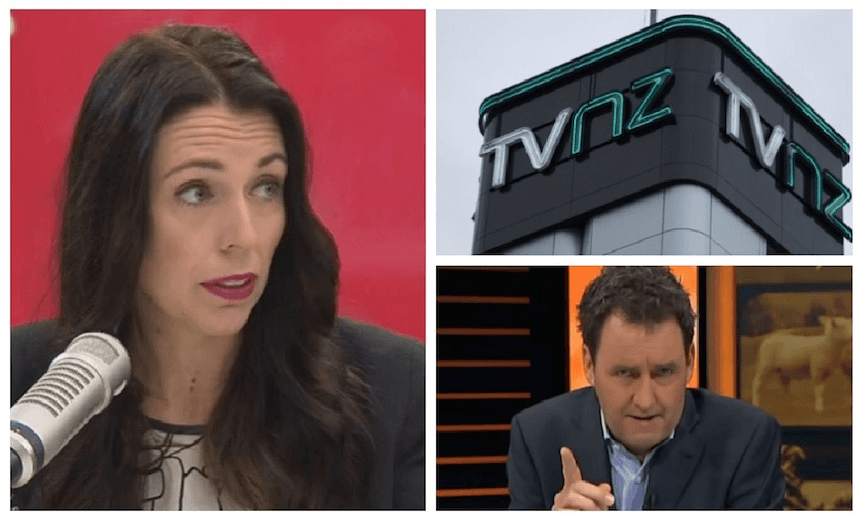Labour’s non-commercial RNZ+ multi-media network is a brilliant idea – but it makes no sense to keep it and retain public ownership of TVNZ, argues Duncan Greive.
Labour:
[We will] develop a new public digital media service… [including] a free-to-air noncommercial television service. The working title is ‘RNZ+’
Also Labour:
TVNZ will remain in public ownership.
Labour released the ‘Broadcasting and Digital Media’ section of its ‘Manifesto 2017’ today, a six page document which seeks to pivot to the future while not abandoning the past, much like the media itself. The hero item is a $38m package of funding for the first year’s work on RNZ+: a “a non-commercial, audio-visual and multi-platform entity [including] include a free-to-air noncommercial television service… developed from Radio New Zealand. The working title is ‘RNZ+’.”
This is essentially a beefed up version of what we already have at RNZ – which operates “a non-commercial, audio-visual and multi-platform entity” across radio, web, social and some free-to-air – chiefly bolting on a full non-commercial free-to-air TV channel.
How that $38m gets split will be critical. If it leans too much on television it risks resourcing a (slowly, but still) dying medium which is predominantly enjoyed by older New Zealanders.
Lean too far toward online and it could create another TVNZ7 – the non-commercial channel launched in 2008 which had a lot of worthy but poorly-lit content that few watched (though all that did signed a petition afterwards).
There’s a further danger that a really grunty online news channel would have a chilling effect on private news media – read: mainly Stuff and the Herald – cutting directly into their still-thin digital revenue streams just at the moment that earlier investment should be starting to bear fruit.
It also, in its emphasis on more state-owned and non-commercial media, represents a victory for the ‘Campaign for Better Broadcasting’ – a group of well-meaning public broadcasting enthusiasts who have long argued that New Zealand needs an ABC / BBC-style commercial-free TV channel.
On balance the RNZ+ side of the equation looks positive. Under Paul Thompson’s reign as Chief Executive the organisation has gone from a moribund and elitist bureaucracy to a much more vibrant and vital entity. There are new and younger hosts; syndication agreements and collaborations with multiple media outlets; an impressive online operation; a growing stable of original podcasts and a cool youth-centric website.
That all this has been accomplished with year after year of zero budgets suggests that RNZ has become adept at doing a lot with relatively little – and thus the $38m it’s being offered (roughly doubling its current budget) could go a long way.
That’s the good stuff. The rest is basically a kick the can exercise: NZ on Air to continue in current form, subject to a review; an interesting but maddeningly vague reference to “investigate ways to support” investigative journalism “across all media platforms” – including a specific reference to “print media”; “no policy to bring all media and advertising standards and complaints procedures together under one entity” – IE retention of the Broadcasting Standards Authority in its current archaic form.
So far, so good enough: the fact is that the pace media is changing – like that of many industries – is faster than government can realistically handle. Maybe it’s the new normal, maybe the smoke clears and some sort of stability ensues. But its definitely a hard environment in which to legislate, let’s not kid ourselves.
The one section which really screams out is this: ‘TVNZ will remain in public ownership’. Because, why? A decade ago the previous Labour government attempted to regain control of TVNZ. It instituted a charter and funded it to run identity-fostering channels like Heartland, TVNZ6 and TVNZ7. Bluntly, the host rejected its new appendages.
Now we have a very similar intention, pushed through a completely different entity. TVNZ has proven itself so resistant to even token displays of public-spiritedness that this current Labour administration has decided to cut it out almost entirely, only asking that it help RNZ+ with some basic “technical, operational and ‘back-office’ services”, while showing their trust in TVNZ by warning that these will come “at audited and transparent cost with an agreed margin”.
Given that we are now setting up, essentially, a second branch of TVNZ on a non-commercial basis – something New Zealand television was for only a matter of months following its debut in 1960 – the matter of TVNZ’s public ownership screams for attention. It is no longer paying a dividend of any substance to the government: a pitiful $1.4m will be returned this year, and, as mentioned before, it proudly refuses to entertain any conception of non-commercial public utility. Yet it retains a huge audience which would be valuable to some potential acquirers, and has enough green digital shoots to be plausible as something more than a pure sunset business.
For now at least. Who knows what the future holds? It might be that TV channels have only a few years of natural life left. In which case, isn’t the most responsible thing a government can do to get out while it still can, and to pour what it gains into RNZ+?
Unfortunately, while much of its policy implicitly shows how little faith Labour has in TVNZ, it remains unwilling to take the painful but necessary step of actually cutting the cord.
